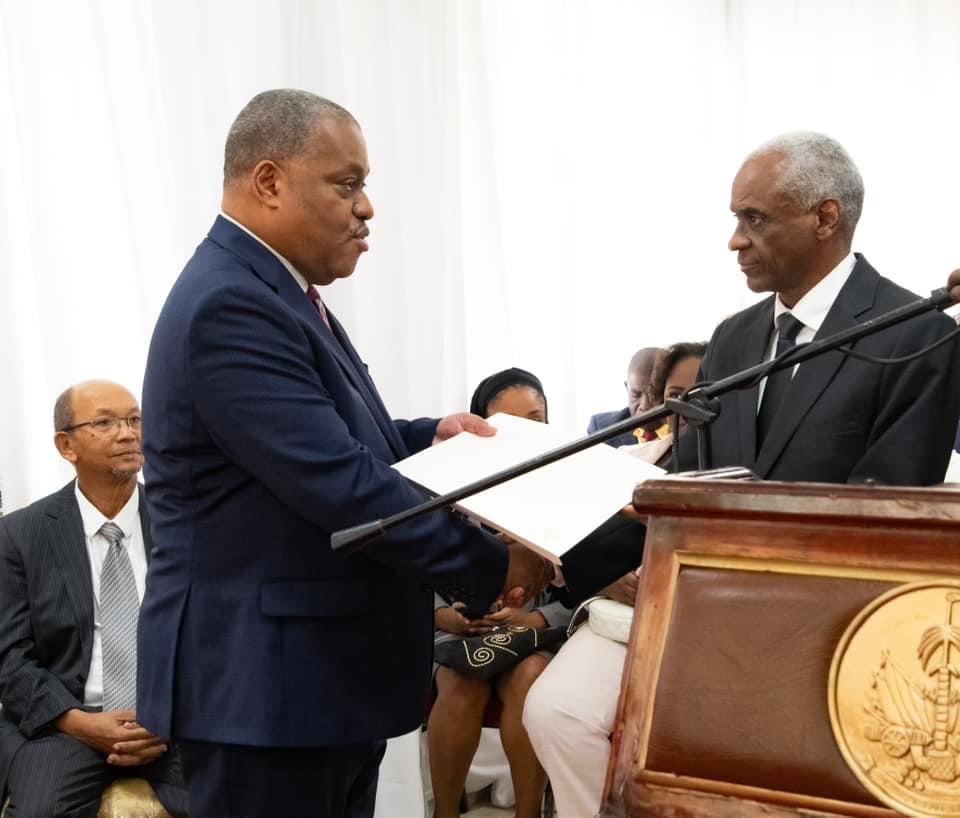Eight ministers indebted to the 9 Presidential Advisors alongside six others who owe everything to Garry Conille: How long will this “political deal” between the PM and the CPT last?
What is the roadmap for these ministries during this transition period? Is there an agreement on the main lines of action of these ministers, with regard to the Agreement of April 3? For the moment no one knows.
The first government of the Presidential Transitional Council in Haiti is the result of a “political deal” between Prime Minister Garry Conille and the 9 advisors-presidents who agreed with and without the support of the sectors and political parties they are supposed to represent to share 18 ministerial positions.
This “deal” is not official. It cannot be formalized or declared. His logic is questionable and dubious. The PM cannot appear with pride in front of the population to defend it; because the majority of the population will not recognize themselves in it.
This is a secret agreement: Gérald Gilles, for example, will never say what he promised the PM and others to allow his young protégé to become the holder of the Ministry of health.
However, the “deal” is very real. Potentially it can hold surprises. “Pral gen plenyen”.
And popular malice has already associated each of the Leblanc/Conille government ministries with political parties or very specific sectors.
Now to designate the Ministry of Public Works, Transport and Communication, the people speak of “Ministry of Lavalas”, The Ministry of Agriculture is renamed “Ministry of Pitit Dessaline”
All this to make it known that the results of this fragile understanding found between the CPT and Prime Minister Conille, who privately denies being in the service of the PHTK regime, even without a press release from the Prime Minister, are well known.
Thus, Prime Minister Garry Conille, under the pretext of guaranteeing their neutrality in the current process, has given himself the right to designate incumbents for the Ministry of the Interior and Territorial Communities, the Ministry of Justice and Public Security, the Ministry of Foreign Affairs, Religious Affairs and Haitians Living Abroad as well as the Ministry of Economy and Finance, Planning and Cooperation.
What is the roadmap for these ministers during this transition period? Is there an agreement on the main lines of action of these ministers, with regard to the Agreement of April 3? For the moment no one knows.
The other ministries, according to the very logic of the PM, therefore become annexes of political parties or groups and are reserved for the presidential advisors or political, economic and civil society sectors who signed the agreement of April 3 and who make up the Council Transitional presidential election.
-The Ministry of Defense was assigned to the RED/EDE/Historical Compromise coalition, made up of several heads identified with the PHTK regime (first and second version), such as the ex-Chancellor Claude Joseph, the ex-Secretary General of the Councils of Ministers Renald Luberice, the former Deputy Patrick Norzeus, the former Minister of Commerce Jonas Coffy, the former senators Youri Latortue and Joseph Lambert, as well as the spokesperson for the RASANBLE Party, Jean Rony Alexandre.
-The Ministry of Agriculture, Natural Resources and Rural Development and the Ministry of the Environment (MARNDR/MDE) were allocated to the Pitit Dessalines party of former senator Moise Jean Charles.
-The Ministry of Social Affairs and Labor (MAST) – attributed to the civil society of Gédéon Jean and allies.
-Ministry of Public Health and Population (MSPP) is reserved for President Advisor Louis Gerald Gilles has coveted this ministry for a long time. However, he faces criticism from some signatories of the agreement who accuse him of not having respected his verbal commitment to Vikerson Garnier, according to which Gilles was to be president and Garnier minister.
-The Ministry of Public Works, Transport and Communications (MTPTC) was assigned to Fanmi Lavalas, which, unable to obtain the Ministry of Public Health, settles for the MTPTC.
-The Ministry of National Education and Vocational Training/Ministry of Culture and Communication (MENFP/MCC) – attributed to President Advisor Fritz Alphonse Jean.
-The Ministry of Trade and Industry/Tourism (MCI/Tourism) was assigned to the representative of the January 30 agreement, which involves several influential political parties in the country, including OPL, PHTK, UNIR and MOPOD..
However, all those who know how public administration works in Haiti, the modalities for making administrative decisions, the role of a Director of Cabinet of the Prime Minister in the functioning of other ministries, having noted that the Prime Minister eager to place at his side, his right arm, a worthy representative of the PHTK regime of all versions, Professor and economist Nesmy Manigat, as Director of Cabinet, immediately understood that the former Director of UNICEF had ideas very precise behind the head.
As a seasoned United Nations technocrat, he is not as “harmless” as he might seem.
And the sharing of ministerial positions that he implemented between several groups or political parties and the PHTK in a government which should be, according to the April 3 Agreement, a government of rescue and national unity, may lead to certain problems.
We identified 10 of the main difficulties:
1- Coordination difficulties: Ministers in Garry Conille’s Government belonging to different parties certainly have divergent priorities and political agendas, which complicates the coordination of government policies.
Risk of decision-making blockage: Disagreements between the parties represented in the Conille/Leblanc Administration on important issues can lead to blockages in the decision-making process, thus slowing down government action. Political instability : Coalitions can be fragile and prone to breakdown if parties fail to resolve their differences, which can lead to political crises and frequent changes of government. Political clientelism: Each party could try to favor its voters and its specific interests to the detriment of a more global and coherent government policy. Lack of accountability: Ministers may be seen as more loyal to their home party rather than the government as a whole, which could compromise individual ministers’ accountability. Political inconsistency: The compromises necessary to maintain the coalition can lead to inconsistent or contradictory policies that do not always optimally serve the public interest. Poor resource management: The distribution of resources between ministries may be unbalanced or inefficient due to concessions made to maintain coalition unity. Decision-making opacity: Internal coalition negotiations can take place in private, reducing transparency and potentially fueling discontent among voters and the public. Challenges for government communications: Communicating a clear and consistent government message can be compromised when different parties within the coalition have divergent positions on important issues. Impact on international credibility: An unstable coalition or one perceived as incapable of making effective decisions can weaken a government’s credibility on the international stage, affecting diplomatic relations and international agreements. These issues show the potential challenges that the Conille/Leblanc government may face. And some observers ask how long this “political deal” between the PM and the CPT will last?
Similar articles



